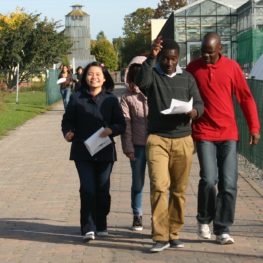Leibniz Universität Hannover
| Location | Hannover is the capital and largest city of Lower Saxony, a federal state in northern Germany. With parks and its world famous baroque garden, an adventure zoo and a big lake, it is a city of high recreational value, which also offers numerous cultural events. Students like Hannover’s short distances and even topography for bike-riding. At the same time the city is host to several of the biggest commercial exhibitions in the world, among them the world’s largest IT and agricultural technology fairs. The heart of Leibniz Universität Hannover, founded in 1831, beats in the idyllic Welfenschloss, the Guelph Palace. Over 20,000 students and more than 2,300 academics and scientists study and work here. |
| Course focus | Worldwide economic growth increasing the pressure on natural re- sources coincides with rapid population growth, which requires intensified food production. Sustainable development calls for new scientific knowledge and technologies that can be transferred to producers around the world. Horticulture, being one of the most intensive forms of land use, can meet this challenge by preparing its future professionals with the necessary expertise.
The Master of Science in International Horticulture (abbr. “M.Sc. Inter- national Horticulture”) focuses on training young professionals in new technologies such as biotechnology, numerous subjects involving new laboratory skills, and the planning and execution of surveys in the economic specialisation, which often comprise fieldwork in developing countries. Modern facilities and specialisation
provide an almost unique array of subjects for specialisation in combination with modern research facilities. A specialisation in economics with particular relevance to developing countries is offered. Course structure Supervision and Integration Every student in the Master’s programme is assigned a work space in the institute in which the research is carried out. Thus students will be easily familiarised with their subject. The permanent contact with staff members will also help students adapt to the German way of life. |
| Target group | Young professionals in the field of horticulture, agriculture, biology, or related subjects including horticultural and agricultural economics |
| Course language | English |
| Entry requirements |
|
| Degree Awarded | Master of Science in International Horticulture (M.Sc.) |
| Course Begins | Beginning of October every year |
| Course Duration | 24 months |
| Course Structure | M.Sc. Horticulture_Prüfungsordnung M.Sc. Horticulture_Struktur M.Sc. Horticulture_Studienordnung |
| Duration of German language course prior to beginning of programme | 2 months (for students awarded a DAAD-scholarship) |
| Remarks | Our students benefit from an outstanding support system including logistic and administrative support. You will be integrated into the research groups of our institutes from the very beginning of your stay. We aim at tutoring every student individually throughout the two years at our institution. Our contact to outgoing students is very close, and we maintain our active alumni network, which has over 250 members. In addition, we offer various cultural and professional events to students and alumni regularly.
The M.Sc. in International Horticulture has a 17-year long tradition of training in mixed classes of German and international students. Lecturers with extensive research and training experience in English and German will provide high-level classroom and laboratory instruction. A mix of junior and senior scientists with a large international network offers our students the opportunity to assist in high quality research groups. To gain practical experience a four-week internship is offered to our students during the course. For DAAD scholars: A two-month intensive German course will take place in August and September after a Ger- man DUO-Online study period. The M.Sc. in International Horticulture programme is accredited by ZEvA in accordance with international standards. |



